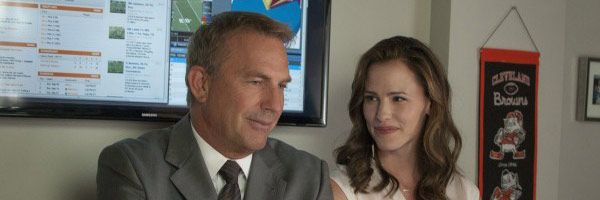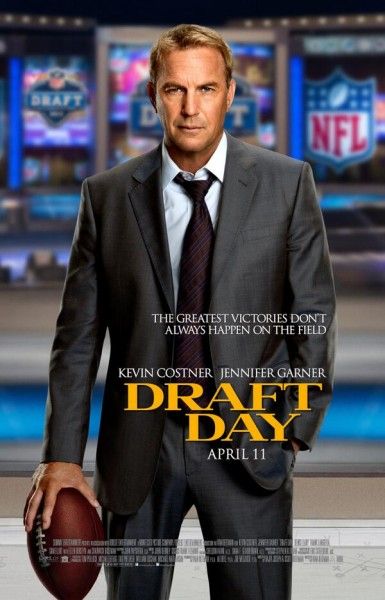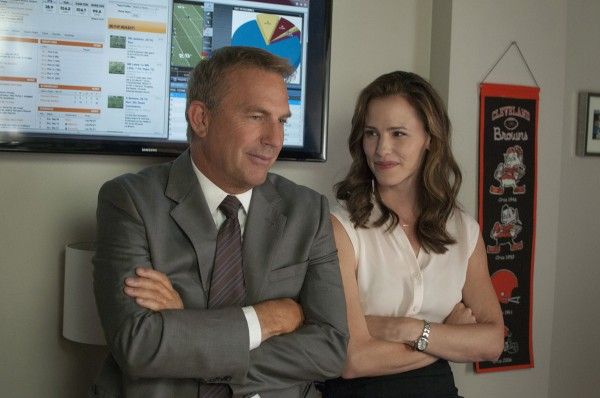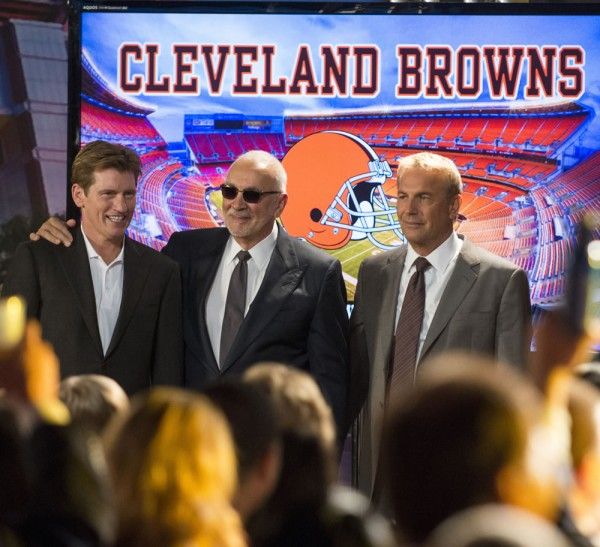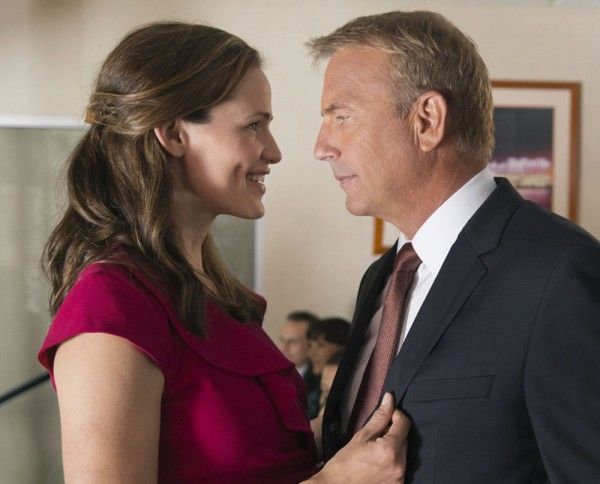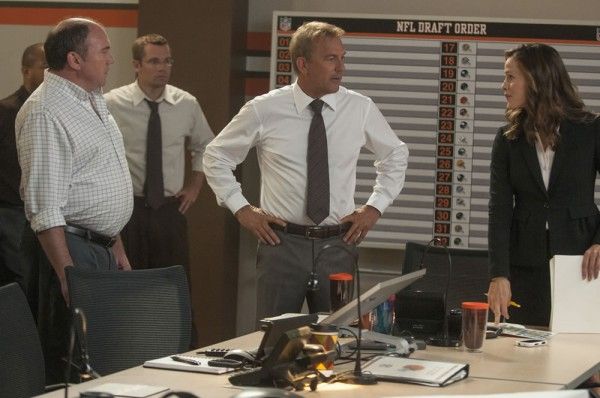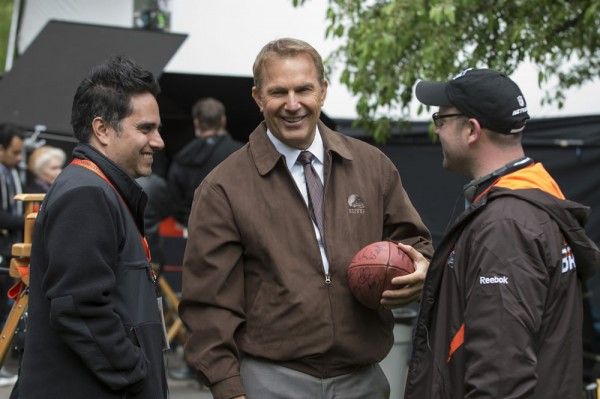Kevin Costner brings gravitas and believability to his role in Draft Day as Sonny Weaver Jr., the hard-pressed general manager of the Cleveland Browns who finds himself in what seems like a no-win position on the most important day of his life. Facing pressure from all sides, he must quickly decide what he’s willing to sacrifice in order to stay in the game as the lines between his personal and professional life begin to blur. Opening April 11th, the film directed by Ivan Reitman also stars Jennifer Garner, Denis Leary and Ellen Burstyn.
At the film’s recent press day, Costner turned introspective as he looked back on his career, the films he’s made, and the movies like Giant that have inspired him. He spoke about his conviction that Draft Day can become a new sports movie classic, how he lives off his intuition and passion, how his roots have developed him personally and defined him as an actor, why he feels we can learn a lot from movies, what he finds creatively exciting and satisfying about storytelling within the sports framework, how The Big Chill was his personal Draft Day moment, his favorite sports movie The Pride of the Yankees with Gary Cooper, and his new movie Black and White which tackles notions of racism.
There’s a line of dialogue that you deliver in this movie where you say, “What do you want?” toward the end of the film. Is this a direct reference to Field of Dreams where at one point you asked the same question?
KEVIN COSTNER: Well, I’ll tell you, it’s a thing that you have to say to women once in a while. (Laughter) It’s really a line that I think I’m probably speaking for every guy in the world, and maybe that’s why some of these movies have worked sometimes. It’s like “What is it? Just tell me, Jesus Christ! What is it you want?” I think, you know, maybe somebody should ask us that, too. What is it you want? It’s such a cool thing in life to get what it is you want. Most of the time we don’t, but occasionally we do. Sometimes it takes a partner to say, “What is it you want?” because I think we operate in life and sometimes we don’t know. We’re all in some kind of maze going after the cheese at the end, and we get it and we go, “What is it that we want?” I think I just wanted to work when I finally came to Hollywood. That’s what it was. I wanted to get a job, and then I wanted to get the second one. What is it you want? Well, what was it I wanted? Maybe I didn’t want to have to go to work on Monday. I mean the repetition of the same type of job, not that there’s anything wrong with that. But what was it that I wanted? I knew I didn’t want that. I didn’t mind working a hundred Mondays in a row, but I wanted to be done at some point and I wanted to move onto something fresh. I wanted to move onto something different. It’s never bothered me to work hard. I’ve probably worked on some of the longest schedules in movie history. Dances with Wolves was 108 days. I think The Postman was 113. Wyatt Earp was 120 and Waterworld was 157 days. It was six-day weeks and I was directing in a couple of those movies. So, working hard has never been the problem. What is it you want? That’s a question that we all get posed sometimes internally and sometimes externally. Somebody just asks us and do you have the answer. It’s been a pleasure to say those lines in movies. (Laughs)
This movie is as much about instinct and passion as it is about brawn and money. Has your perspective on who you are and what you bring to this game been based in any part on your instincts? Have you always trusted your instincts?
COSTNER: My whole life has been instinctual for me. I wouldn’t do well in the computer world. My children look at me for a question and then they quickly look away because they know that I’m not going to know how to make Super Mario or do anything. I wanted what everybody wants, which was a sense of direction. Right at the time you’re 18 or 19 or 20 years old in college, everybody that you run into that knows your parents goes, “Well, what’s he gonna do?” Finally, you want to say, “Who gives a fuck. It’s not up to you what I do. And I don’t know what I’m going to be. And I don’t know that I’m going to be a doctor. I don’t know that I’m going to be a lawyer.” It’s the convention of knowing what you want to do. I have instinctually thought I could do things in my life, and I followed that up by sometimes putting everything I have at risk – my money, my house – to make a movie. I just did it again with Black and White, a little film that I made about the notion of racism in this country and how we have such a difficult time talking about it. That movie reminds me a lot of Field of Dreams in that there’s a speech in the end that gives us a window to all finally step through and go, “Okay,” because we’re not going anywhere in this world. We’re all in this together. We have to learn how to talk with each other. And so, my instincts were wildly at play late in my career, a rock that I have to push uphill just to make it. Nobody really wanted to make it. It’s my hope that you’ll all see it. It’s my hope that it becomes as important as Field of Dreams or Dances with Wolves. I think it will be because it’s about people. It’s funny. It’s poignant. It’s sad. And, in the end, it gives you hope. So, I do live off my intuition. I do live off my passion. I realize that I’m not in battle. I’m not in combat. “Oh, that’s very brave to do.” Well, I’m not exactly in Vietnam. I’m not in Iraq. If I want to make a little movie about racism, I should do it, and maybe the studio should, too. “Oh, it’s dangerous to make a movie about that now. I’m not sure about that.”
Even this little movie (Draft Day) didn’t have a lot of homes. Lionsgate was the one that saw the potential and protected it. “Oh, I don’t know. It’s just about one day in the draft?” But it’s not. It’s really about the human element. It’s about boy and girl. It’s about, “Could we not talk about this on my most important day of the year?” She says, “No, we’re going to talk about it now.” That is such a woman. Jesus Christ! (Laughter) It’s like, “Wow, could we pick a better day?” “No, we’re talking about it now.” And then, what does she do? She drives off in a huff. (Laughter) I still have my day to go through. I see her in the hall. She acts like everything is alright. And we laugh. And that’s what the movies, when they’re working at their very best, are about. It’s the moments like that where we see ourselves and we chuckle. When we’re in the middle of our own life, it’s not very funny and we’re confused. But this movie, it’s not about football. It’s about that age old thing of people who love each other who just can’t seem to get it together for a while and then finally do. We adore that. We want that. We make amends with my mom and we want that, too. And I tell that guy, “You pancake-eating motherfucker,” who’s been mean to me, and you know what, we kind of wish we were Sonny right then, and we’re kind of glad what he says to that guy, vulgarity aside. It almost needed the vulgarity because the guy was such a bad winner, right? Don’t you hate bad winners? The guy was a bad winner all day, and I had to nail him right there at the end. I’m glad that single line didn’t spin this movie into an “R” because we see what “R’s” really are out there. But this was a moment that needed all the salt and pepper. It needed everything to let this guy know. I basically said it for everybody in the audience. That’s what needed to be said to this prick at that moment. Movies can do that. The difference between movies and our own life is that sometimes in these heated moments we don’t know what to say and we wish somebody wrote our own script for us. And it doesn’t always work that way. We fumble.
Did you have any input into Sonny once you got the script?
COSTNER: Yeah, but it was a really good document. “Pancake-eating motherfucker” was my contribution.
You’ve played some very diverse, iconic roles throughout your career and you always bring something of yourself to every character. Can you talk about how your roots helped develop you personally and define you as an actor?
COSTNER: Well, you know, I thought I had the greatest upbringing. I thought I had the biggest yard. I didn’t realize we didn’t have any money hardly until I went and saw a kid’s backyard and they had a pool in it. And I began to understand that there were things, but I don’t know. The way I was treated my parents came to every one of my games because it was important to them. And every time I sang, they came. I built a church in Paramount and a guy snapped a red line down and he said, “You nail all day long.” So, that’s what I did. As a four year old, I thought I had helped build a church. I don’t know how that defines you, but it was part of my upbringing which was family. My roots were that.
Also, the movies helped define how I should be as a person. That may sound funny, but there’s a lot for us to learn at the movies. I remember watching Giant as a boy and I saw Rock Hudson and James Dean and Elizabeth Taylor. Rock Hudson starts out as a bit of a bigot, a bit of a racist. His boy’s going to marry a little Chicano girl, and in Texas that just ain’t gonna happen because of the Alamo, because of everything. It ain’t gonna happen. And so, he starts off as a racist. I also love the movie because it’s over three hours long. Duh. (Laughter) So what happens is you have this big 3-hour movie and I saw how this man was very disappointed in his son’s choice. Somehow his son let him down. The movie has this arc. I don’t know how many of you know the movie. Well, in the end, what happens is a lot of times pass and this wealthy, wealthy family that had nothing and now has unbelievable wealth is dysfunctional. It’s in rags. It’s a wreck. And this man, this giant of a Texas man, finds himself in this diner with Elizabeth Taylor and his son’s wife, his daughter-in-law, and this little Chicano baby. They’re going to have a hamburger because they’re on a road trip, and it’s dusty West Texas and the man won’t serve them. Rock Hudson doesn’t get it at first. “Won’t serve me? What do you mean you won’t serve me?” Rock Hudson is a pillar of Texas, and he (the waiter) nods at the little Chicano baby and this Mexican woman, and Rock Hudson is suddenly affronted and he says, “You will serve them!” and he gets into a fist fight, an old-fashioned fist fight, and The Yellow Rose of Texas is playing. If you don’t think I watch these things carefully, you’re missing me. (Laughter as he hums the melody to the song) And they start fighting. It’s a knock-down-drag-out and the guy defeats Rock Hudson, which in the movies doesn’t happen all the time. Right? The leading man doesn’t lose. The leading man wins, but not in this fight. He takes a terrible beating by a Korean vet, a guy who was a tough guy. Classic movie stuff, too -- two tough guys, not a tough guy and a weak guy. It’s two tough guys fighting and Rock Hudson loses. Elizabeth Taylor is in tears. His daughter-in-law is in tears. The baby is crying. Glass is breaking. At the end, Rock Hudson is laying in a pile on the floor and the guy just looks at him and realizes, “Man, I don’t want to fight Rock Hudson anymore.” He just puts a sign on him that says “We reserve the right to refuse service to anyone.”
Rock Hudson loses, but Elizabeth Taylor goes over to him and gets down and says, “You’ve never stood taller.” I thought to myself, that’s who I want to be -- the guy on the floor and he lost. So, a long story to say I’ve never been afraid of things not working. I think it’s an underrated experience in life. I’ve had some wild, wild successes. I try to clean up the oceans. I try to do things. I’m not afraid to be on the floor as long as I’ve got my girl to come say, “I saw what you’re trying to do.” And so, we can learn a lot from the movies.
Can you talk about what you find creatively exciting and satisfying about storytelling within the sports framework?
COSTNER: I think if you want to make a good sports movie, you’ve got to cut down on the sports. You have to make it about people. You can’t try to impress people with your knowledge and the X and O’s and all the details and the technicalities. “See, we know about this sport.” You gotta know that people are going to sit down. They will have gotten babysitters. In certain instances, they’re going to be like, “Why are you dragging me to this movie?” And then what happens is you have to conduct scenes that can speak to that person that says, “Why’d you bring me to this movie? Draft Day is about one silly day. Don’t we watch football enough all year around? We gotta go see it now on the big screen?” “Just come with me to the movie. Please Kevin, make this fuckin’ movie good. Please, please, please!” (Laughter) And so, the lights go out and the movie starts and women start to see themselves and men start to see themselves. And yes, there’s this backdrop of the NFL. He wants to tell his mom that they’re going to have a baby. There’s a lot going on in the movie. That’s when movies are always going to be at their best. It’s when they are about moments, and I’ve said before, the smallest gesture that maybe you never ever forget. There are too many movies that we see that we can’t remember one thing from them. Sometimes the thing you remember is the wink. If you can orchestrate a movie where we remember wanting to have a catch… Field of Dreams, the big moment was, “Dad, you want to have a catch?” It’s not even close to a car wreck or a fist fight or a gigantic battle. You want to have a catch. And, at that moment, we all broke over a single line. Because why? Not because we all wanted to play baseball, but we’ve all had a life where things have gone unsaid in our life to somebody we actually really love. That moment just opened the ball on that. Movies can do that. I felt that Draft Day had a chance to be an American classic if we stuck with it. I don’t know if it will be a box office hit, but I think it can be a classic movie, which by definition means it will be shared from generation to generation. To me, that’s the mark of a great movie.
Sonny is under a lot of pressure in the movie. How do you deal with pressure in real life?
COSTNER: (He asks for the question to be repeated and it is.) Thank you. It’s not your fault. It’s me and rock and roll. (Laughter) You were perfect. In the old days, they’d say, “You’re not listening, Kevin. Go to the back of the class.” I’d go, “Oh that really helps! Wow, I can’t hear and now I’m in the back. That’s a really sensitive teacher.” (Laughter) I deal with pressure. I have a tendency to probably be at my best under pressure. I’ve said before when somebody asked me this, I actually play sports better when I’m mad. Some players don’t play better when they’re mad. They lose their sense of where they’re at. I have a tendency to do better when I’m under pressure. I’ve had moments in my life where it was all out on the table. Everything I had. I’m okay with that, because I had a strong belief that what I was doing other people could believe in it, too, if I can get it just right. I have a tremendous belief in people, not that people don’t let me down, not that I haven’t maybe let some people down. But I have a tremendous belief in people and in the common experience. I feel like I’ve been able to live a dream life, but my view of things is absolutely inside behavior about how I behave and how I count on other people behaving.
Ivan Reitman said when he was reading the script that he was hearing this voice but he wasn’t quite seeing the face, and then a couple days later, he was like, “Oh my God, it’s Kevin Costner.” When a director comes to you about a part and says…
COSTNER: He didn’t tell you about the bong, did he?
No?
COSTNER: The bong hit he had? (Laughter)
He skipped over that.
COSTNER: See, it wasn’t coming to him and then he bonged up. (Laughter)
For you, as an actor, how do you react when someone comes to you and says, “I want you to be in this because of who you are and what people will see you as on screen”?
COSTNER: Well, some people come to you because if you’re in their movie, it’ll help them raise money. And some people come to you because they think you’re the person to play the part. I’ve always been distracted when somebody is coming after me and saying, “You’re the only person who can play this part.” And then, if you say you can’t play the part, they cast Jeff Goldblum in the part. Jeff Goldblum is a very, very good actor, but we’re different. We’re really different. So, if I’m the only person who can play this part, you would think that maybe… I’ve been in a place where if I couldn’t get somebody to play a part, I wasn’t going to make the movie. I mean what I’m saying, so I like being around people that mean what they say. For Ivan, I think it was about the part, and if there was baggage, he cast it aside. For him, it was about I think Kevin should play the part. Let’s be honest, it’s nice to be wanted in almost any capacity. I come to this restaurant and the girl walks by me for 30 minutes. I wish she’d want to serve me. (Laughter) It’s nice to be wanted. That’s a really good feeling. I’m not immune to it.
What was a Draft Day in your career?
COSTNER: I think getting in The Big Chill. I think that was the moment.
Even though ultimately you weren’t in The Big Chill?
COSTNER: But again, that’s instinctual, too, because somebody wants to say it wasn’t good if it wasn’t fulfilled and it wasn’t a hit. There are athletes that you pick sometimes not based on their statistics but what you actually intuitively know they can do. And so, for me, I didn’t need the box office. I didn’t need to appear in the movie to know that that was a pivotal moment for me. Other people maybe go, “Oh man!” But for me, I knew that it was happening so I looked at it differently.
Do you have a favorite sports movie?
COSTNER: I’ve always loved Pride of the Yankees. I just did. I’m a Walter Brennan, Gary Cooper fan.
Have you considered doing any projects in Mexico?
COSTNER: I’m confident working in New Mexico. I’m a little less confident working in Mexico right now just because of everything we hear. I’m just trying to be really honest with you. I’ve worked in Mexico many times, and now I’m not certain about how I could do it or if I would do it because of the obvious problems that are going on. I like my family to be with me and I don’t want anyone to be at risk. Not that they would be, but I’m like anybody else, I just have a feeling. I wouldn’t want them at risk.
Any chance your band, Modern West, will be coming to Boston?
COSTNER: Yeah, I’m on the East Coast for 14 days starting April 12th.
We’ll be looking for you.
COSTNER: Take a look on the website. Something’s got to be close to you.

